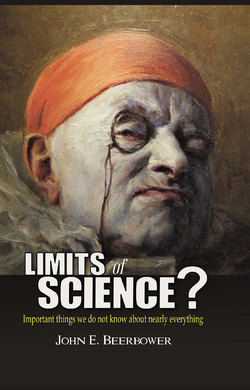Читать книгу Limits of Science? - John E. Beerbower - Страница 11
На сайте Литреса книга снята с продажи.
More on deduction
ОглавлениеThe common view has been that a theory of scope can achieve something that mere inductive inferences cannot.10 Such a theory can enable one with logical certainty to make predictions about or to foresee consequences of certain actions beyond the immediate relationship that gives rise to the inductive inference of causality. That ability would seem to offer the promise of a statement of causality that has real content, even if certain aspects of the theory may more appropriately be called fictions (like the “gene”). For example, instead of the relative primitive understanding that fire burns (or is hot), one could achieve a theory of what causes combustion, what the process of fire actually is, what the impact on living cells caused by fire is and why we feel pain following contact with fire.
Of course, one would not need or expect to generate theories sufficient to explain the entire chain of events at one time. Pieces of the chain can be examined and theories propounded for each piece. In part, the success of each such theory will ultimately be judged by whether that theory fits into the theories that are tentatively accepted for the other pieces. If it all works when the pieces are put together, one feels more confident that each piece is right.
Let me suggest that an interesting question is whether we can say that a theory can ever be expected to be true or reflect reality. Cf. Paul Feyerabend, The Tyranny of Science (2011) (original published in Italian in 1996), p.66. Many scientific theories consist of a substantial edifice of theoretical (or mathematical) propositions that touches the physical world only occasionally and may, in some of those places, do so only incidentally. As we shall see later, much of modern physics consists of abstract mathematical models, many parts of which have no currently known or even imagined counterparts in the physical world. Great excitement is generated in the broader scientific community when a researcher is able to identify an empirically testable proposition and then find that the prediction of the theory is “confirmed” by the empirical test. The excitement arises even when the testable hypothesis is in no sense central or at the core of the theory; it can be a remote and quite technical implication of the theoretical construct. The scientific community views the lack of falsification as a partial confirmation that the theory is true. But what does true mean in this context? Do we expect that the theory might, can or even should correspond to reality in the sense of resembling or modeling the details of reality?
